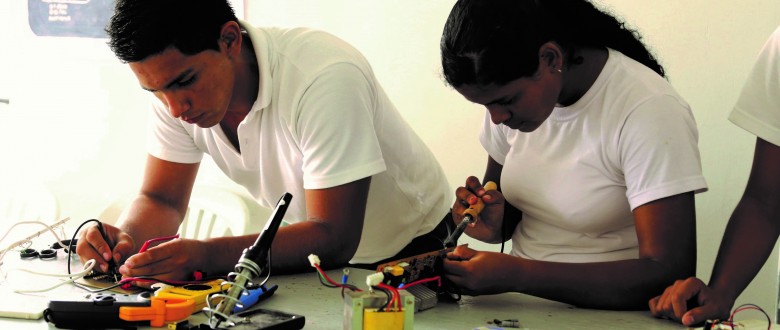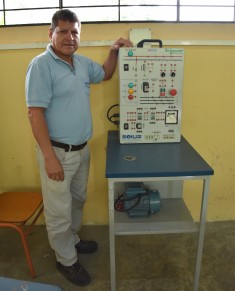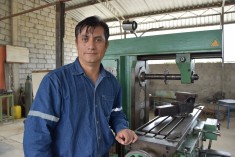
Santiago Castillo and Rubén Rumipulla are teachers in a secondary school in Santo Domingo, Ecuador. They are both part of an RCC project in their respective fields, which builds partnerships between schools and private businesses: “Companies contact us for the details of students who have graduated here, because they know they have more and better skills than most students.”
Teacher development, real equipment, on-the-job training
According to the United Nations, young people are almost three times more likely to be unemployed than adults. In Ecuador, the skills mismatch between what employers are looking for and what newly graduated youngsters can offer them is one of the underlying challenges. To meet this one, VVOB works alongside schools and private organisations to align the former’s educational approach to the latter’s needs in so-called RCC projects.
‘RCC’ stands for ‘Relación Colegio-Comunidad’ in Spanish, or ‘School-Community Partnership’ in English. With these projects, VVOB does exactly that: create partnerships between secondary schools offering technical and vocational education and training (TVET) on one side and (local) private businesses on the other. Schools with certain specialised technical courses are matched up with businesses in the same field.
VVOB’s current RCC projects are built on 3 pedagogical pillars: TVET teachers benefit from training in their field by the private partner on-site; the private partner offers learning materials to schools, so students can learn to work with the technical equipment; and private partners offer on-the-job learning experiences to students.
Anxious hands
RCC projects don’t just strengthen teachers’ and students’ skills and knowledge to both their benefit and to the benefit of the businesses seeking good employees. They also boost the motivation levels of these young adolescents. Teachers Santiago Castillo and Rubén Rumipulla from the Jaime Roldós Aguilera secondary school in Santo Domingo, Ecuador, attest to that.

“RCC projects are a real motivational tool”, Urban Electrification Teacher Rubén (left) says. “I excite my new secondary students in year 1 with the promise that they can eventually work with real equipment. They aren’t allowed to use it then just yet as we have to lay the theoretical foundations first, but they work hard towards that goal. By year 3 they are anxious to get their hands dirty, and if they’ve studied hard enough, they can.”
Jaime Roldós Aguilera secondary school is an ‘antenna-school’ for all the secondary schools in the area offering electricity courses. That means that the private partner, Schneider Electric in this case, donated equipment to this particular school, but students from other schools travel to the antenna-school and practice with the equipment too.
A case of excitement
In Santiago’s case, the equipment is shared differently: in a ‘maleta’. Santiago (right) explains: “A maleta is a case with equipment that travels from school to school. I’m an industrial mechanics teacher and in our RCC project the case contains six welding machines and protective equipment worth around 10,000 dollars, donated by Ideal Alambrec Bekaert.”

As the cost of some TVET courses goes up in parallel to the student’s advancement in years, the donated equipment mitigates the important issue of high drop-out rates to some extent. Where Santiago counted 40 students in year 2, he’s left with 13 in year 3.
“The maleta passes by our school once a year for six to seven weeks or so, and we take full advantage of that timeslot”, Santiago continues about the valuable equipment. “Initially, only our third-year students were allowed to use it, but now students in their second year can have a taste of practice already. We plan our lessons around the arrival of that equipment.”
Santiago too stresses the positive impact of practical work on his students’ motivation. “One time, the equipment lingered at our school due to unforeseen circumstances, and the students were very happy to work with it for as long as they could.”
Self-perception is key
More students at the school choose a TVET option over a general science-related option in secondary education, and it’s no secret the RCC projects partially influence that choice.
Even though the number of girls in courses that are involved in RCC projects is limited – Santiago counts 3 percent girls in his classrooms – there is some positive evolution. Especially in auto mechanics and Rubén’s urban electricity classes, a modest trend towards more female enrolment is noted. “And the girls that do get a degree in electricity, find a job in their field”, Rubén is proud to say.
“But better job opportunities aren’t the only reason why I’d like more girls to opt for a course like mine. Just like the boys do, they too get to work with the electrical equipment, which is relatively dangerous. And because they have that opportunity, I can tell they perceive themselves differently, stronger.”
Contesting second place
High motivation levels and female empowerment aside, the main goal of RCC projects is to provide students with decent job opportunities after graduating, and private partners with a decent workforce to choose its new employees from.
Of the first batches of graduates involved in an RCC project at Jaime Roldós Aguilera secondary school, around 80 percent found a job related to their field of study, Santiago and Rubén, who follow up on their graduates, estimate.
“Our school has built up a good reputation too”, Santiago says. “Companies contact us for the details of students who have graduated here, because they know they have more and better skills than most students. Or our students are hired by the companies they intern for.” Internships are mandatory by law in Ecuador, and part of RCC projects too.
The school regularly showcases its students’ skills in local competitions, where their commitment to carrying out the RCC projects is affirmed yet again. “Just last week we had a fair with different schools, and other students couldn’t properly work with the equipment”, Rubén says. “And last year, at an event in Quito about youth skills, our students finished second in a challenge-solving competition, where they had to build an electricity circuit. The winning team was a lot older and more experienced, and if it weren’t for some arbitrary technical rules, we would’ve won!” Rubén exclaims with Santiago nodding agreeably.




